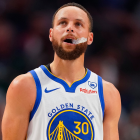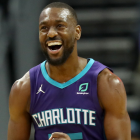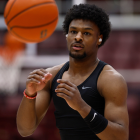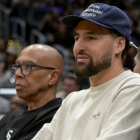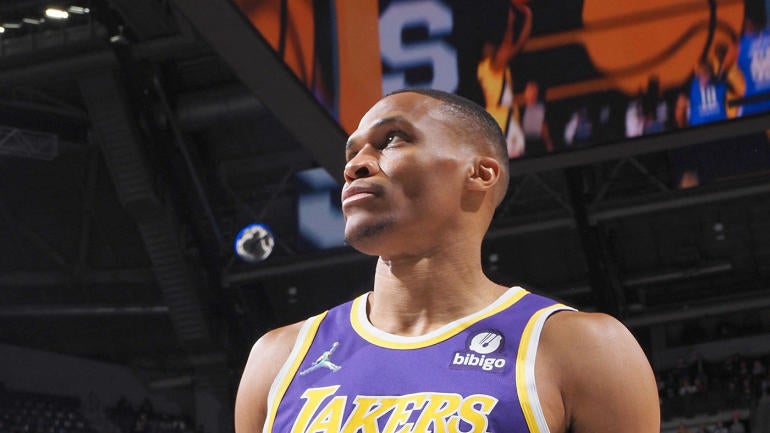
We go into every offseason believing that Russell Westbrook will be impossible to trade … and then he gets traded. It's becoming a bit of a tradition. Even before his disastrous season with the Los Angeles Lakers, common sense dictated that no team would want to add a post-prime point guard who couldn't shoot on a supermax contract. Eventually, someone always does.
There's going to be a faction of the basketball-viewing public that scoffs at the idea that the Lakers can trade Westbrook after the season he just had. That notion seems far less ridiculous once you divorce yourself of the notion that a Russell Westbrook trade needs to have anything to do with Russell Westbrook. Unlike previous offseasons, the team trying to trade him no longer needs to convince some sucker to take on his long-term deal. Once Westbrook inevitably picks up his player option, he becomes a $47 million expiring contract. That has value no matter what player it is attached to.

CBS Sports HQ Newsletter
Your Ultimate Guide to Every Day in Sports
We bring sports news that matters to your inbox, to help you stay informed and get a winning edge.
Thanks for signing up!
Keep an eye on your inbox.
Sorry!
There was an error processing your subscription.
So what kind of team might actually take him? They need to check a few boxes. Any team considering a Westbrook deal has to have $40 million or so in salaries to send the Lakers, ideally in the form of useful veterans. That team needs to either want to get off of those contracts for long-term flexibility or have a need at point guard that Westbrook can fill. If it's the latter, the team needs to have fairly limited ambitions, as Westbrook's poor shooting, defense and attitude no longer lend themselves to contention or sharing with other stars. It must also be stylistically flexible enough to handle a non-shooter as its primary ball-handler.
Sounds simple enough, right? Well let's go through all 29 NBA teams aside from the Lakers and figure out who fits the bill.
Out for lack of need
Phoenix Suns: They're trying to win a championship and they have Chris Paul.
Memphis Grizzlies: Ja Morant is basically a prime Westbrook as is.
Golden State Warriors: The NBA's most expensive team doesn't need the NBA's most expensive backup point guard.
Denver Nuggets: Prime Westbrook with Nikola Jokic would've been one of the great transition shows in basketball history. Current Westbrook may not be as good as Monte Morris, much less Jamal Murray.
Minnesota Timberwolves: They already have one overpaid point guard in D'Angelo Russell. No need to add a second.
San Antonio Spurs: There might not be a worse backcourt fit in basketball for Westbrook than Dejounte Murray, another non-shooter who needs the ball in his hands.
Sacramento Kings: Your career prospects aren't great when even the Kings say "no thanks," but what can Westbrook do at this stage aside from rebound that De'Aaron Fox can't? If Sacramento wanted to escape his max contract, the Kings might be a stealth option, but Vivek Ranadive is far too focused on a play-in berth to see the possible benefits of such a stealth tank.
Portland Trail Blazers: If CJ McCollum was still here, a Westbrook-plus-picks package would've served a similar function as the trade Portland ultimately made with New Orleans. With McCollum gone, though, the Blazers will either try to build around Damian Lillard, which Westbrook can't help with, or try to trade Lillard, which would create a bidding war the Lakers can't win.
Boston Celtics: Marcus Smart answered all of the doubts this season. He can be the point guard of a great team. Even if he can't, the Celtics aren't gonna swap him out for Westbrook.
Toronto Raptors: Fred VanVleet is essentially the anti-Westbrook: a great shooter and defender with limited athleticism and star-power. The Raptors prize those traits. If they had a contract to dump, Masai Ujiri might think about it, but in basketball terms, they'd have no interest in Westbrook.
Chicago Bulls: How many Bulls guards are already better than Westbrook? Certainly Zach LaVine, DeMar DeRozan and Lonzo Ball. Probably Alex Caruso as well. Ayo Dosunmu will be there soon enough.
Brooklyn Nets: Yeah, not happening.
Cleveland Cavaliers: There's an argument to be made in favor of Cleveland using Kevin Love to get out of the rest of the Lauri Markkanen contract in a Westbrook swap, but Dan Gilbert is too fixated on winning now to make such a downgrade.
Detroit Pistons: What did Cade Cunningham do to deserve this?
Out for lack of desire or contracts
Milwaukee Bucks: The Bucks actually could use a primary ball-handler type in theory. Khris Middleton handles the late-game shot-creation and the Jrue Holiday-Giannis Antetokounmpo duo has shared the bulk of the ball-handling duties very well over the past two years, but a more traditional path to building alongside a talent like Giannis would involve finding him an All-Star point guard. Of course, Westbrook's poor shooting disqualifies him from ever becoming a Buck. Milwaukee doesn't even use centers who can't shoot. Oh, and they can't make the money work without breaking up their big three. So no, Westbrook isn't Milwaukee-bound.
Philadelphia 76ers: Daryl Morey would probably love to turn the two years left on the Tobias Harris contract into an expiring one. That could position the 76ers for significant 2023 cap space before Tyrese Maxey's inevitable extension kicks in a year later. The issue is that next season is also probably their best chance at winning a championship with James Harden. He's not getting any younger, and unless he's prepared to compensate with improved conditioning habits, he's going to age out of stardom fairly quickly. We've already seen how poorly he fits with Westbrook in Houston. Morey can't punt a season just for 2023 cap space knowing that Harden, who will turn 34 before the 2023-24 season tips, will almost certainly be past his prime. That rules a Westbrook-for-Harris swap out.
Orlando Magic: Even if you'd argue that the Magic should try to dump the Markelle Fultz and Jonathan Isaac contracts, the Lakers probably wouldn't be all that interested in them as the centerpieces of a Westbrook trade. That's likely moot, though. The Magic took home run swings on both. They'll want to see those swings through rather than adding Westbrook and taking shots away from their other young guards.
Los Angeles Clippers: Basketball drama aside, Westbrook has made it clear this season that being close to his family in Southern California matters to him. The Clippers are linked to Westbrook every time his name hits the trade cycle. It's never really made sense. This is a team that prioritizes defensive versatility and 3-point shooting above all else. Aside from the big men, every player who played at least 500 minutes for the Clippers this season launched at least 100 3-pointers. Westbrook will comfortably take those shots, but he certainly won't make them. Reggie Jackson gives them enough traditional point guard play, and even if he didn't, the Clippers have since recouped enough trade capital over the past few years to find a better fit.
New Orleans Pelicans: There isn't a traditional point guard on this roster, but that's by design. When healthy, Zion Williamson is going to be the primary ball-handler here. CJ McCollum has thrived in his stead, and without including him or Brandon Ingram in a deal, there really isn't an easy path to the Pelicans cobbling the salaries together anyway.
Almost certainly out … but let's game this out
Miami Heat: Miami is typically in the business of adding stars, not subtracting them. But let's say the Heat suffer an early postseason exit, and let's say that the sideline blowup between Jimmy Butler and Erik Spoelstra was demonstrative of bigger issues between the two of them. Butler signed a $184 million extension last offseason that hasn't even kicked in yet. He's 32, injury prone and doesn't have a skill set that typically ages well. If the Heat sense that their championship window is closed, a Westbrook-for-Butler-and-picks swap could serve as a get-out-of-jail-free card on that lofty extension. The Heat could then reload quickly when Westbrook's contract comes off the books in a year. This isn't how Miami typically operates, but there's valid logic to it if this postseason goes badly enough.
Dallas Mavericks: The Mavericks viewed the Kristaps Porzingis contract as so toxic that they moved out at the deadline not for upgrades or even cap relief, but deconsolidation. The Spencer Dinwiddie and Davis Bertans deals combine for a similar price. Dinwiddie has played well in Dallas thus far, but that was a happy accident. The deal was made for financial reasons, and if cap flexibility is motivating the Mavs' moves right now, Westbrook could potentially get them off some of their other long-term deals. If Dallas could use Westbrook to escape the Bertans and Tim Hardaway Jr. contracts, it could possibly even create max cap space as soon as 2023 depending on what other moves it makes. This all relies on the Lakers wanting Dinwiddie, Hardaway and Bertans, though, and that doesn't feel likely.
Utah Jazz: Another "break glass in case of playoff disaster" team. If Utah manages to pull together after its late-season slump? The Jazz are not touching Westbrook. He's antithetical to everything they do schematically. But if they somehow lose to the injured Mavericks in the first round and start to consider a rebuild? Westbrook could be their ticket out of the last year of Mike Conley's contract as well as a pathway to more picks. The Lakers could certainly use Conley and Bojan Bogdanovic, but Utah would have to go into a full-on rebuild for this to make sense. That's not likely, but changes are coming to the Jazz if this postseason goes badly enough. Of course, given Westbrook's history in Utah, he'd likely demand a buyout if he got sent to the Jazz.
Atlanta Hawks: The Hawks are about to get very, very expensive. Trae Young will jump to a Rose Rule max if he is named to an All-NBA team. Kevin Huerter, John Collins and Clint Capela all got hefty deals over the summer, Bogdan Bogdanovic has two pricey years left and De'Andre Hunter and Onyeka Okongwu are coming up on their own extensions. If there are a few players in that group who the Hawks would rather not pay, Westbrook is their way out. If he could solve the backup point guard problems they've had since drafting Young? Then all the better.
Washington Wizards: Technically, the Wizards still can't reacquire Westbrook. They'd have to wait a year after dealing him, though that timeline would likely be slightly sooner in the name of last season's altered offseason schedule. Once that threshold is reached, though, Washington becomes one of the few teams that might actually want Westbrook on their roster. After all, their ambitions rarely extend beyond the No. 8 seed, and Westbrook helped them get there a year ago. He and Bradley Beal coexisted well, and if the Wizards have any buyer's remorse on Porzingis, they could try to stick the Lakers with him in a Westbrook deal. More likely, Washington becomes a possible landing spot once Westbrook is bought out by someone else, but when a team might actually be excited about adding Westbrook in 2022, they warrant inclusion in this section.
The likely contenders
Oklahoma City Thunder: The Thunder have no great interest in a reunion with Westbrook. Shai Gilgeous-Alexander is their point guard now. They do, however, have a brief window leading up to the draft in which they can use their mountain of leftover 2021-22 cap space. That cap space evaporates when the league year flips over because of Gilgeous-Alexander's new contract, so if they can get value out of it by taking on Westbrook, it's something they might consider. The flip side of that, though, is that the Thunder are already about to jump over the cap due to Gilgeous-Alexander's contract, and they still have dead Kemba Walker money on their books. Are they really willing to flirt with the tax by taking on Westbrook just for a few more draft picks? That's unclear.
Houston Rockets: Some version of the John Wall trade that was discussed at the deadline will be available over the summer simply because teams are as uninterested in Wall as they are Westbrook. If the Rockets are willing to lower their asking price, there is a reasonable deal available here. In fact, one might argue that the Rockets shouldn't even need draft compensation. They'd save more money buying out Westbrook then Wall seems willing to sacrifice.
New York Knicks: The Knicks have the same problem with Julius Randle that the Heat have with Butler: A hefty extension that hasn't even begun is already looking like a possible mistake. Unlike the Heat, who have the No. 1 seed in the Eastern Conference, the Knicks are out of the playoffs. Miami would be sacrificing genuine championship equity by giving up Butler. The Knicks would be sacrificing the vibes of a former No. 4 seed. If they can get off of Randle and hand the power forward position over to Obi Toppin, they probably should. Throw in some combination of Evan Fournier, Kemba Walker and Nerlens Noel for good measure and you've got yourself a decent smorgasbord of role players for the Lakers.
Charlotte Hornets: The Hornets are going to come dangerously close to the luxury tax once a new deal for Miles Bridges is accounted for. P.J. Washington is coming up next and LaMelo Ball will surely get the max after that. Charlotte has to clear some long-term money not only to pay its own players, but add a center at some point as well. Gordon Hayward is the easy centerpiece here. Combine him with Kelly Oubre and Mason Plumlee and the Hornets save in both the present and future. Swap those two out for Rozier and Charlotte's cap sheet looks significantly cleaner moving forward.
Indiana Pacers: If there's a favorite here, it's Indiana. The fit makes too much sense. The Pacers are ready to hand their backcourt over to Tyrese Haliburton and Chris Duarte. That makes Malcolm Brogdon and Buddy Hield expendable. Hield is a former Lakers target. Brogdon would be a stellar fit. Both have long-term deals the Pacers probably don't want to pay. If the two sides can come to an acceptable compromise on draft compensation, this is the trade that makes the most sense for all parties involved.










